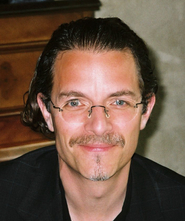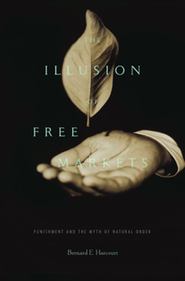University of Chicago professor Bernard Harcourt is a student, but not a follower, of the Chicago School, an academic movement that has had a profound effect on America in the period since World War II, pushing the country aggressively toward an embrace of neoliberal ideas about economics and politics. In his latest book, The Illusion of Free Markets: Punishment and the Myth of Natural Order, Harcourt probes deeply into some of the contradictions inherent in the thought of the Chicago School, and exposes a striking historical parallel to its work. I put six questions to Harcourt about his new book:
1. Your book builds off an intriguing study of the eighteenth-century French Physiocrats — François Quesnay, Pierre-Paul Le Mercier de la Rivière, and others — in which you suggest that their theories of economics closely parallel what we have come to think of as the Chicago School. What exactly are the parallels, and how did this idea come about?

It’s the messianic belief in natural order in economics — in spontaneous order, as Friedrich von Hayek called it — or today in the efficiency of free markets, conjoined with a faith in strong government to deal with those who are outside the natural order — who are out-of-order, or disorderly. It’s the combination of those two paradoxical tenets — of government incompetence when it comes to regulating the economy and government competence when it comes to policing and punishing — that links these thinkers. Undoubtedly there were others before the Physiocrats who brought the idea of natural order into economics — Pierre de Boisguilbert, for instance, or the Scholastics with their notion of “just price.” But Quesnay and his disciples, especially Le Mercier, did so with a doggedness, obsession, and passion that would change the way people thought — a doggedness and obsession, I should add, that resembles the persistence of Hayek or Richard Epstein. It’s that maniacal, quasi-religious faith in natural orderliness or today market efficiency that ties these thinkers together.
For both the Physiocrats and the Chicago School, there is an orderly inside but also an outside — and for those outside, there is the iron fist of the state. The Physiocrats called for “legal despotism.” “The only object of man-made, positive law is to punish severely men whose passions are out-of-order,” Quesnay wrote in 1767. These two paradoxical tenets were joined together for the Physiocrats, and you can hear it well, again, in Quesnay: “All that is required for the prosperity of a nation is to allow men to freely cultivate the earth to the greatest possible success, and to preserve society from thieves and rogues [“des voleurs et des méchants”]. The first task is governed by self-interest; the second is ensured by civil government.” Looking back at Quesnay’s writings offers us a kind of recul— a French term for stepping back to see better — on how the idea of natural order would evolve into the invisible hand and laissez-faire, later into spontaneous order, and ultimately into a theory of free markets. By the same token, it lets us see better how the idea of legal despotism evolved into a theory of the state as “night watchman,” into Jeremy Bentham’s panopticon prison, and finally into Richard Posner’s argument that the “major function of criminal law in a capitalist society” is to prevent “market-bypassing.” To be sure, the language and rhetoric has metamorphosed over two centuries. But the logic — the structure of the argument — is the same.
Now, how it all came about, that’s a fascinating story that journeys through Hayek and natural law for the libertarians such as Richard Epstein, and through Bentham for the utilitarians and the pragmatists, such as Becker and Posner. They all came together thanks to the writings of my dear colleague Ronald Coase (who repeatedly scolds me that he was never part of the Chicago School). But to understand all this, I think I’ll refer you to the long chapter on the Chicago School in the book itself.
2. You suggest that members of the Chicago School, particularly Richard Posner, have drawn on the eighteenth-century Italian philosopher-statesman Cesare Beccaria in a way that falls short of fully understanding him. What did they miss?
They missed his economics! It’s not entirely surprising, given that Beccaria’s economic writings have been forgotten by history and never translated into English. But Beccaria was primarily an economist. Joseph Schumpeter referred to him as the “Italian Adam Smith” — but in importance only. His economics, as you will see, were radically different than Smith’s.
Beccaria was an adamant regulator, not just of proportional punishment, but of commerce and trade as well. The same year he published On Crimes and Punishments, he was computing algorithms for the optimal tariffs to augment the wealth of the prince. There was a perfect consistency in Beccaria’s thought that led him from his cameralist beliefs to a regulatory conception of criminal law, and that allowed him to see that markets are policed in the same way that we police the streets. He would teach his economics students about policing and finance in the same breath.
Becker and Posner drew heavily on Beccaria’s punishment writings. In fact, Beccaria had articulated most of the important law-and-economics insights in the criminal area by 1764 (from marginal deterrence, to the trade-off between length and certainty of punishment, to the use of mathematical algorithms to solve criminal law questions). But they missed his cameralism and mercantilism, and as a result embraced an internal inconsistency: a strict, Beccarian regulatory framework for criminal law, but a hands-off approach to free-market exchange.
3. You’ve leveled sharp criticism at some of your most prominent colleagues in Hyde Park. How has this affected your relationship with them?
One of the most remarkable things about the University of Chicago is that we genuinely prize ideas and criticism. Hyde Park is truly extraordinary for the intensity of its life of the mind. We dish it out hard — harder than anywhere else I’ve been. But with that comes a certain mutual understanding and respect: we want to hear each other’s best criticism, and we value it.
I know for myself that my work has consistently sharpened in Hyde Park as I’ve had to respond to my colleagues’ criticisms — and let me tell you, they have been pointed. The presentation of my Chicago School chapter at the University of Chicago faculty workshop was at times explosive. But I value that tremendously and believe that Becker, Epstein, Posner, and others value it as well.
As for what they say about me among themselves, well, I’ve no idea! But frankly, that’s secondary. Getting it right matters more. Each year our entering class at the University of Chicago adopts a motto. My favorite one goes, “It’s all fine and good in practice, but how does it work in theory?” That’s by far the most important — getting it right, both in practice and in theory.
4. You show us that Le Mercier talked about limiting the role of government in the marketplace, yet when he was dispatched to govern Martinique he proved heavy-handed. Likewise you seem to think that libertarians, especially right libertarians, talk a good game about small government, but that if they got their hands on the rudder they might be harsh rulers. What’s your evidence for this proposition?
True-blooded right libertarians have never gotten their hands on the rudder in part because they eschew the kind of political compromise that’s required for electoral politics. Thinkers like Hayek, Ayn Rand, Robert Nozick, and for that matter Richard Epstein have had extraordinary intellectual influence, but have never been given the opportunity to steer the ship. To predict what would happen, you’d have to look at someone like Ronald Reagan, the rhetorical champion of small government — which would confirm my point. President Reagan was the great initiator of our national debt crisis. He tripled the debt, increasing it by $1.9 trillion, and set us on our present course of massive deficits. More to the point, he oversaw the prison buildup and the war on drugs. He and his attorney general, Edwin Meese, put us on the path to mass incarceration. Reagan spoke of limited government, but put into practice that paradoxical — and expensive — alchemy of purported privatization and the police state.
5. You associate neoliberal concepts with the staggering rise of the U.S. prison industry. Are you arguing that the move toward a privatized prison industry has unleashed market forces that drive an expanding business — as we saw recently when prison-services corporations were found to be behind lobbying efforts for harsh measures to incarcerate immigrants who are “out of status” — or do you have a different take on the issue?
My argument, as I’ve clarified over at Balkinization, is not that privatization or other neoliberal policies are responsible for mass incarceration (though they have undoubtedly contributed). In the book, I demonstrate instead how neoliberal ideas were born — and remain today — joined at the hip with the Big Brother state. The idea that the government is incompetent except when it comes to policing has facilitated the slide to mass incarceration. That mindset makes it difficult to pass economic regulation, but easy to multiply criminal offenses and increase the severity of punishment. Or, as Posner has written, to send only the poor to prison (the wealthy can be fined) and provide only “a bare-bones system” of indigent defense (anything more would be inefficient).
I focus on the role of ideas not to disparage the importance of policies like the war on drugs, truth-in-sentencing, or law-and-order politics, but to refocus attention on how theories shape our practices. That paradoxical way of thinking has facilitated penal excess, certainly during the past forty years of neoliberalism, but also when the penitentiary was born at the beginning of the nineteenth century — a period historians now refer to as “the Market Revolution.” Periods of strong belief in free-market ideals have gone hand in hand with the birth and escalation of the prison system.
6. In the latest rounds of discussion about raising the federal debt ceiling there was a remarkable resistance to accepting the costs that flow from simultaneously waging three wars and increasing defense spending, even as Republicans chanted a small-government, if not a no-government, mantra. Doesn’t this point to an inherently untenable contradiction in Chicago School thought, at least as it is interpreted by political leaders?

Yes, you see where I’m headed! In another book, I will need to extend the analysis to national security — the other domain where big government is perceived as inherently legitimate and competent. I’ve been tracking defense spending over at Balkinization, and it is staggering. Defense represents about 20 percent of the federal budget and 50 percent of the discretionary portion of the budget. The United States is spending more on defense than we’ve spent since World War II, and now accounts for 50 percent of the world’s military expenditures. Defense spending is one of our largest stimulus programs, yet it is never discussed in those terms. That’s the product of that paradoxical opposition between natural economic order and government competence in the realm of security. Prisons and armies, domestic tranquility and national security — you are right, sadly, the two play a similar role in American public discourse.


